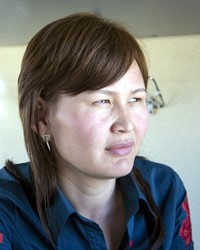Traditionally, the Kazaks were semi nomadic, equestrian tribal people who roamed the Ural Mountains and the regions of northern and Central Asia. As several of the clans formed a federation for mutual protection, they took on an ethnic identity of their own. Kazakh ethnic identity accelerated during the late 15th and early 16th centuries. Since then, Kazakhs have preserved their culture in part by keeping an epic tradition of oral history. During the late 19th and early 20th centuries, the annexation of Central Asia by Russia and the Soviet Union respectively resulted in many Kazakhs fleeing the steppes to Europe and Asia including Ukraine. Since 1991, the government of Kazakhstan, as part of their nation building strategy, has actively supported the return migration of "oralman," (the Kazakh word for those in diaspora), by offering incentives to lure them into settling in Kazakhstan. As a result, one million ethnic Kazakhs have repatriated to their ancestral homeland including those from Ukraine.
Many of these former nomads have moved to cities like Kiev and live in houses or small apartments, taking up low paid jobs. Western style dress is common among Kazakh men and women living in Kiev.
The war between Russia and Ukraine has
No matter where they live, the Kazakhs enjoy their traditional cuisine along with that of the host country. Besbarmak is a traditional Kazakh food, made with lamb. Rice, potatoes, noodles, and bread are common staples. Those who practice Islam do not drink alcohol, but they have tea with almost every meal. Kazakhs extend great hospitality and are open to external influences. They consider it to be an offence to decline an invitation to dine at their homes. Their social occasions are marked with lavish feasts and singing in groups.
The structure of the Kazakh family is patriarchal, or male-dominated, but this is gradually changing, especially in cities like Kiev. Such changes have caused a breakdown in the traditional Kazakh family. However, Kazakhs still retain an extremely hierarchical view and people of age and high position are given great respect and honor.
The Kazakhs are Sunni Muslims and the second largest Muslim group of Central Asia. Their Islamic practices are combined with traditional folk religions such as shamanism, animism and ancestor worship. Many Kazakhs continue to consult shamans (priests who communicate with the spirits). They also practice traditional rituals before and after marriage, at birth and at death. Many of them wear protection beads and talisman to ward off the evil spirits and the evil eye.
Since 1818 missionary efforts by various Christian organizations has borne fruit among the Kazakhs. Today, the entire Bible is available in the Kazakh language. There was a great push to reach Kazakhs in Kazakhstan in the 1990s, but not so much for the Kazakhs in Ukraine. Ukraine is still one of the most religiously free nations of Eurasia. Even though the Russian Orthodox Church holds a prominent position as a Christian institution, the Evangelical Church has seen steady growth with the churches sending hundreds of missionaries to Russia and Central Asia. Western missionaries are heavily scrutinized while the missionaries from within country are free to share the gospel and plant churches. These Ukrainian believers can reach the Muslim Kazakhs.
Poverty is widespread and unemployment rates are high among Kazakhs and other Central Asian people in Ukraine. Corruption and bribery affect their everyday life. Kazakhs in Ukraine need job training and better education so they can thrive economically.
Pray for a "Book of Acts" type of movement to Christ among the Kazakhs in Ukraine. Pray for the Kazakh people to understand and embrace that Jesus wants to bless their families and neighborhoods. Pray for Holy Spirit anointed believers from the Kazakh people to change their society from within. Pray for a movement in which the Holy Spirit leads and empowers disciples to make more disciples. Pray for a movement of Jesus to heal and strengthen Kazakh communities.
Scripture Prayers for the Kazakh in Ukraine.
https://thediplomat.com/2023/04/the-kazakhstanis-picking-sides-in-the-russian-war-in-ukraine/
https://www.aljazeera.com/news/2023/4/6/kazakh-official-not-the-time-to-resolve-differences-through-war
| Profile Source: Joshua Project |











